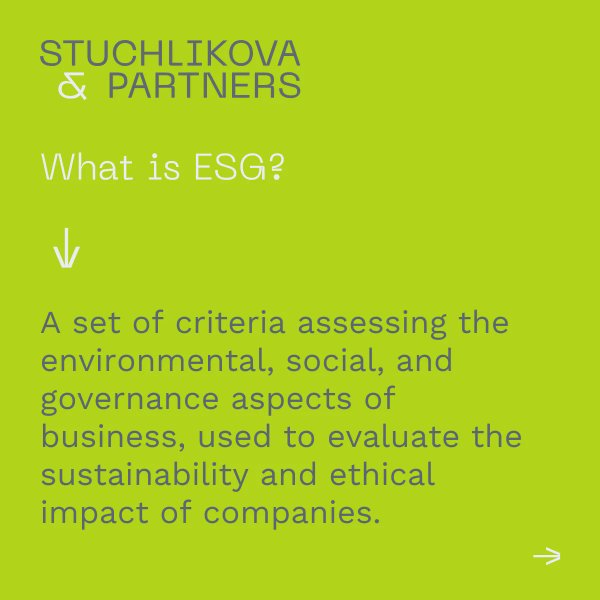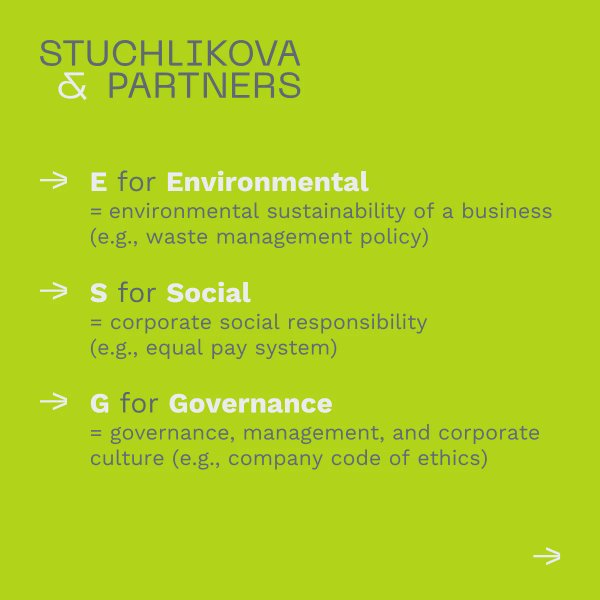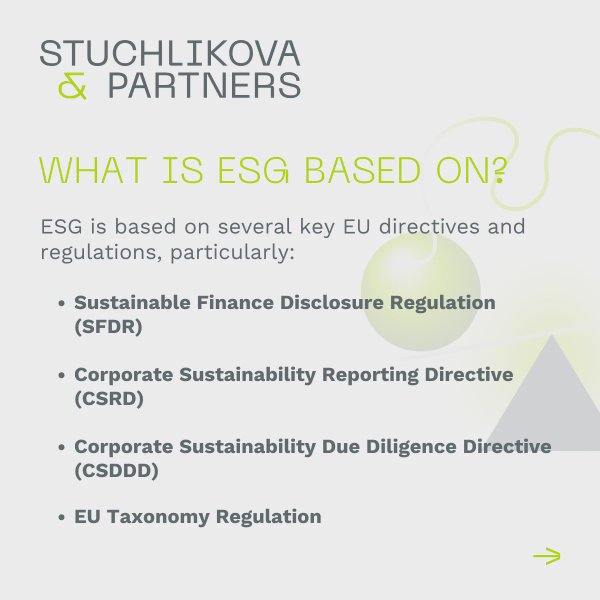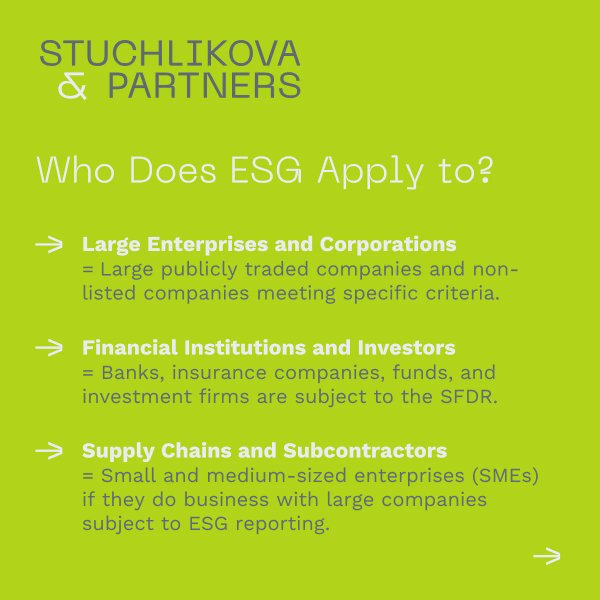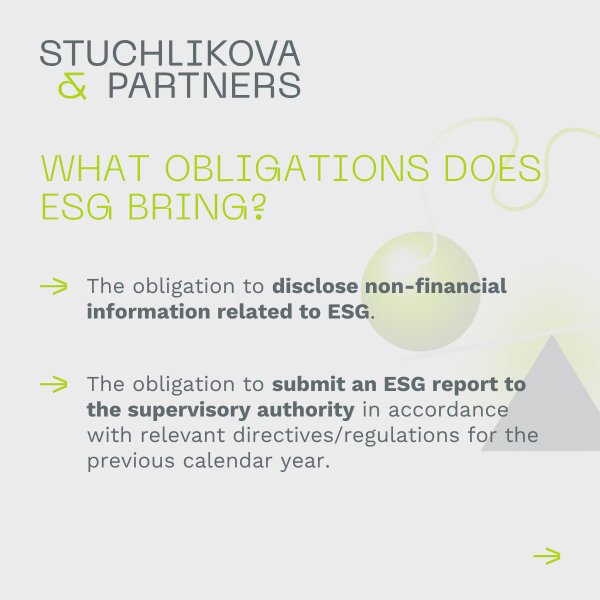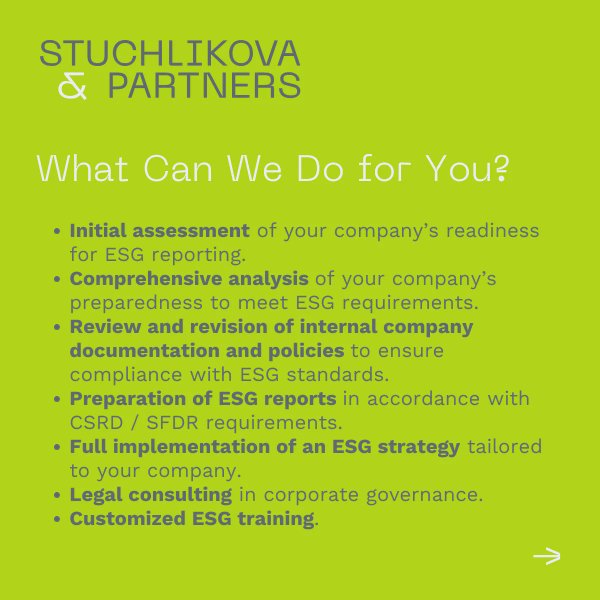ESG - A New Challenge for Your Business
What is ESG?
ESG stands for Environmental, Social, and Governance and refers to environmental sustainability, social responsibility, and ethically responsible corporate governance.
Environmental (E) focuses on a company’s carbon footprint, waste management policies, circular economy efforts, and other environmental protection measures.
Social (S) evaluates working conditions, adherence to human rights in the workplace, equal opportunity principles (including fair remuneration), occupational health and safety (OHS), and corporate social responsibility towards stakeholders.
Governance (G) relates to corporate governance and management, including corporate culture, transparency, anti-corruption measures, company ethics, internal controls, and audit systems.
What is ESG Based On?
ESG is based on several key European Union directives and regulations, particularly:
Sustainable Finance Disclosure Regulation (SFDR)
- Regulation (EU) 2019/2088.
- Imposes obligations on financial institutions to disclose ESG risks and the sustainability of their investments.
Corporate Sustainability Reporting Directive (CSRD)
- Directive (EU) 2022/2464.
- It expands and tightens the requirements for non-financial reporting established in the previous NFRD directive (Non-Financial Reporting Directive), which requires large companies to disclose information about their approach to ESG, including environmental impacts, social issues, and governance.
- Mandates sustainability reporting for a broader range of companies and harmonizes reporting standards across the EU.
Corporate Sustainability Due Diligence Directive (CSDDD)
- Directive (EU) 2024/1760.
- It focuses on corporate responsibility for sustainability and the protection of human rights in supply chains.
EU Taxonomy Regulation
- Regulation (EU) 2020/852.
- It defines the criteria for what is considered an environmentally sustainable economic activity.
Who Does ESG Apply To?
- Large Enterprises and Corporations
The first wave of ESG reporting obligations applies to large companies listed on stock exchanges and non-listed companies that meet at least two out of three criteria (more than 250 employees, revenue exceeding 50 million EUR, balance sheet total exceeding 25 million EUR). These companies must publish their first mandatory ESG reports in 2025 for the reporting period starting January 1, 2024. From 2026, smaller listed companies that meet less strict criteria will also be included.
- Financial Institutions and Investors
Banks, insurance companies, funds, and investment firms are subject to the SFDR (Sustainable Finance Disclosure Regulation). They must disclose how ESG factors influence their investment strategies and inform investors about ESG risks and investment impacts.
- Supply Chains and Subcontractors
Large companies must monitor ESG risks within their supply chains. SMEs (small and medium-sized enterprises) are not directly obligated to report ESG, but if they conduct business with large corporations, they may be required to provide ESG data as part of contractual relationships.
What Can We Do for You in the ESG Area?
Our law firm will guide you through the complete implementation of your ESG strategy quickly and efficiently.
Our ESG services include:
- Initial assessment of your company’s readiness for ESG reporting, including an introduction to ESG legislation.
- Comprehensive analysis of your company’s preparedness to meet ESG requirements.
- Review and revision of internal company documentation and policies to ensure compliance with ESG standards.
- Preparation of ESG reports in accordance with CSRD / SFDR requirements.
- Full implementation of an ESG strategy tailored to your company.
- Legal consulting in corporate governance related to ESG.
- Customized ESG training for your management and employees.
If you are interested in our ESG services, please do not hesitate to contact us at info@stuchlikova.com or call +420 222 767 393 to schedule an informational consultation.


